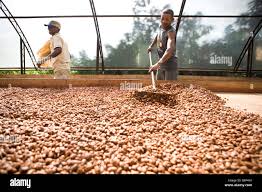Côte d’Ivoire has officially opened a 233 million-dollar cocoa grinding facility, one of the largest in the country’s history, as part of a broader strategy to transform its role in the global cocoa market from raw commodity exporter to industrial processor.
The facility is central to the government’s ambition of processing at least 50% of the country’s cocoa locally, a significant policy shift for the world’s leading cocoa producer.
The new complex, which spans 21 hectares, is equipped with an initial annual processing capacity of 50,000 tons of cocoa beans and is expected to reach a production output of 210,000 tons of processed cocoa products over the next two years.
These products include cocoa paste, cocoa butter, and cocoa powder, intermediate goods vital to the international chocolate and confectionery industries.
The plant’s infrastructure also features a 160,000-ton storage warehouse, a training centre for trade and technical skills development, and a fully equipped administrative block, positioning the facility not only as a production hub but also as a centre for human capital development and sectoral innovation.
Côte d’Ivoire currently accounts for around 40% of global cocoa supply, yet a large portion of that cocoa has historically been exported in raw form, limiting domestic earnings from value-added processing.
The commissioning of this facility signals a deliberate move by the Ivorian government to capture greater value from its agricultural exports by investing in processing and industrial infrastructure.
By prioritising local transformation, the initiative supports key national objectives including industrialisation, job creation, technology transfer, and economic diversification.
The government also views the project as a means of stabilising revenues from cocoa, reducing dependence on global commodity price fluctuations, and strengthening Côte d’Ivoire’s negotiating position in international markets.
The facility is expected to play a critical role in building a sustainable, export-oriented cocoa processing industry that better integrates Ivorian producers, SMEs, and skilled workers into higher segments of the cocoa value chain.
As demand for traceable, ethically produced cocoa continues to rise globally, Côte d’Ivoire’s investment in domestic processing marks a significant pivot, one that may shape the future of cocoa trade dynamics across West Africa.

